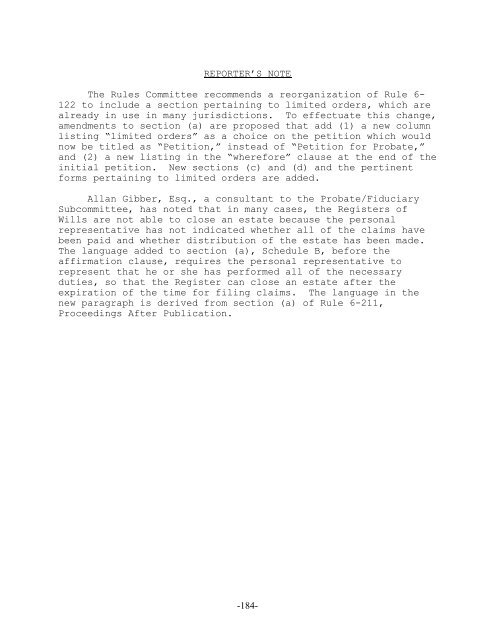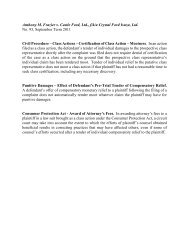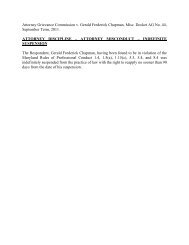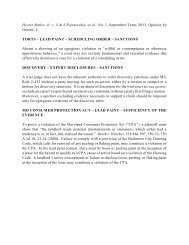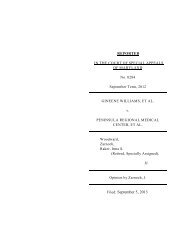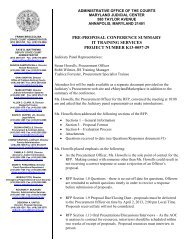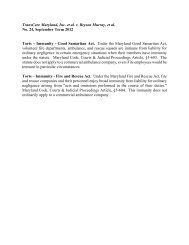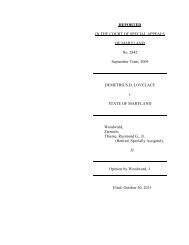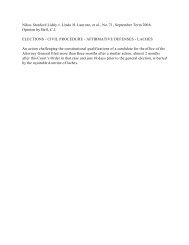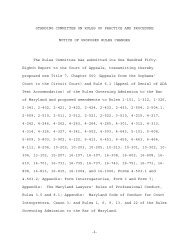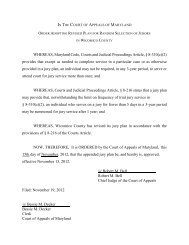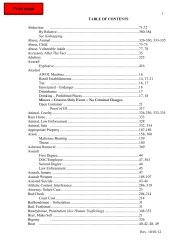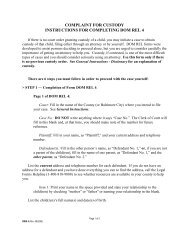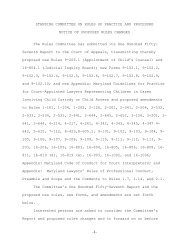- Page 1 and 2:
STANDING COMMITTEE ON RULES OF PRAC
- Page 3 and 4:
July 30, 2003 ONE HUNDRED FIFTY-SEC
- Page 5 and 6:
P. 26 (a)(3). New Committee notes p
- Page 7 and 8:
In Category Eleven are a proposed a
- Page 9 and 10:
For the guidance of the Court and t
- Page 11 and 12:
(c) After Dismissal by the District
- Page 13 and 14:
MARYLAND RULES OF PROCEDURE TITLE 3
- Page 15 and 16:
MARYLAND RULES OF PROCEDURE TITLE 2
- Page 17 and 18:
has jurisdiction for the purposes o
- Page 19 and 20:
whether a transfer will result in u
- Page 21 and 22:
action was not entitled to be trans
- Page 23 and 24:
notice of intention to defend or ot
- Page 25 and 26:
individual members of the class tha
- Page 27 and 28:
or complication in the presentation
- Page 29 and 30:
REPORTER’S NOTE The Rules Committ
- Page 31 and 32:
compromise shall be given to stockh
- Page 33 and 34:
contended that there is a genuine d
- Page 35 and 36:
When a ruling upon on a motion for
- Page 37 and 38:
MARYLAND RULES OF PROCEDURE TITLE 2
- Page 39 and 40:
MARYLAND RULES OF PROCEDURE TITLE 2
- Page 41 and 42:
motions. Cross reference: Rule 2-31
- Page 43 and 44:
MARYLAND RULES OF PROCEDURE TITLE 2
- Page 45 and 46:
of any insurance agreement under wh
- Page 47 and 48:
written report made by the expert c
- Page 49 and 50:
Subsection (f)(1) is derived in par
- Page 51 and 52:
MARYLAND RULES OF PROCEDURE TITLE 2
- Page 53 and 54:
MARYLAND RULES OF PROCEDURE TITLE 2
- Page 55 and 56:
MARYLAND RULES OF PROCEDURE TITLE 2
- Page 57 and 58:
allowed. The transcript may then be
- Page 59 and 60:
transcript was not signed and retur
- Page 61 and 62:
was present or represented at the t
- Page 63 and 64:
MARYLAND RULES OF PROCEDURE TITLE 2
- Page 65 and 66:
MARYLAND RULES OF PROCEDURE TITLE 2
- Page 67 and 68:
MARYLAND RULES OF PROCEDURE TITLE 2
- Page 69 and 70:
REPORTER’S NOTE The proposed dele
- Page 71 and 72:
MARYLAND RULES OF PROCEDURE TITLE 2
- Page 73 and 74:
MARYLAND RULES OF PROCEDURE TITLE 2
- Page 75 and 76:
decisions made at the conference. T
- Page 77 and 78:
REPORTER’S NOTE The proposed amen
- Page 79 and 80:
MARYLAND RULES OF PROCEDURE TITLE 4
- Page 81 and 82:
MARYLAND RULES OF PROCEDURE TITLE 1
- Page 83 and 84:
MARYLAND RULES OF PROCEDURE APPENDI
- Page 85 and 86:
REPORTER'S NOTE The proposed amendm
- Page 87 and 88:
MARYLAND RULES OF PROCEDURE TITLE 2
- Page 89 and 90:
may direct that prospective jurors
- Page 91 and 92:
one peremptory challenge for each g
- Page 93 and 94:
MARYLAND RULES OF PROCEDURE TITLE 4
- Page 95 and 96:
(c) Jury List Before the examinatio
- Page 97 and 98:
(g) (h) Designation of List of Qual
- Page 99 and 100:
The court shall appoint at least tw
- Page 101 and 102:
MARYLAND RULES OF PROCEDURE TITLE 2
- Page 103 and 104:
Proposed amendments to Rules 2-521
- Page 105 and 106:
to writing may be taken into the ju
- Page 107 and 108:
(c) "Verdict" Defined For purposes
- Page 109 and 110:
process is not made and the summons
- Page 111 and 112:
and time for trial of the action. W
- Page 113 and 114:
MARYLAND RULES OF PROCEDURE TITLE 3
- Page 115 and 116:
sufficient to allow the plaintiff t
- Page 117 and 118:
(5) A defendant who is served with
- Page 119 and 120:
MARYLAND RULES OF PROCEDURE TITLE 3
- Page 121 and 122:
Rule 4-216. PRETRIAL RELEASE (a) In
- Page 123 and 124:
Article, §5-202 (b), (c), (d), or
- Page 125 and 126:
or the alleged victim’s premises
- Page 127 and 128:
Recommendation of the Rules Committ
- Page 129 and 130:
commissioner's pretrial release det
- Page 131 and 132:
REPORTER’S NOTE The Pretrial Rele
- Page 133 and 134: under subsection (e)(4)(B). A third
- Page 135 and 136: copy of the notice shall be furnish
- Page 137 and 138: REPORTER’S NOTE In his June 21, 2
- Page 139 and 140: MARYLAND RULES OF PROCEDURE TITLE 4
- Page 141 and 142: MARYLAND RULES OF PROCEDURE TITLE 4
- Page 143 and 144: "Information" means a charging docu
- Page 145 and 146: With the addition of the definition
- Page 147 and 148: opportunity for hearing, may requir
- Page 149 and 150: emoval shall designate the county t
- Page 151 and 152: MARYLAND RULES OF PROCEDURE TITLE 4
- Page 153 and 154: MARYLAND RULES OF PROCEDURE TITLE 4
- Page 155 and 156: certain circumstances. (f) Allocuti
- Page 157 and 158: (2) District Court Upon the entry o
- Page 159 and 160: MARYLAND RULES OF PROCEDURE TITLE 4
- Page 161 and 162: MARYLAND RULES OF PROCEDURE TITLE 4
- Page 163 and 164: ond hereby secured remains undischa
- Page 165 and 166: REPORTER’S NOTE The proposed amen
- Page 167 and 168: disposition or a General Waiver and
- Page 169 and 170: imprisonment; and I am not now a de
- Page 171 and 172: company, unincorporated association
- Page 173 and 174: _____________________________ _____
- Page 175 and 176: personal representative and consent
- Page 177 and 178: _______________________________ ___
- Page 179 and 180: contents of the foregoing schedule
- Page 181 and 182: writing, shall set forth the relief
- Page 183: in the presence of the Register of
- Page 187 and 188: otherwise delivers to the creditor
- Page 189 and 190: MARYLAND RULES OF PROCEDURE TITLE 6
- Page 191 and 192: Date: __________________ __________
- Page 193 and 194: MARYLAND RULES OF PROCEDURE TITLE 6
- Page 195 and 196: following form: [CAPTION] NOTICE OF
- Page 197 and 198: MARYLAND RULES OF PROCEDURE TITLE 6
- Page 199 and 200: MARYLAND RULES OF PROCEDURE TITLE 6
- Page 201 and 202: MARYLAND RULES OF PROCEDURE TITLE 6
- Page 203 and 204: 3. I acknowledge that I must file a
- Page 205 and 206: Modified Administration, the person
- Page 207 and 208: Inventory and Account, as required,
- Page 209 and 210: FINAL REPORT UNDER MODIFIED ADMINIS
- Page 211 and 212: ATTACH ADDITIONAL SCHEDULES AS NEED
- Page 213 and 214: which qualify the personal represen
- Page 215 and 216: CONSENT TO EXTEND TIME TO FILE FINA
- Page 217 and 218: MARYLAND RULES OF PROCEDURE TITLE 6
- Page 219 and 220: MARYLAND RULES OF PROCEDURE TITLE 6
- Page 221 and 222: MARYLAND RULES OF PROCEDURE TITLE 6
- Page 223 and 224: MARYLAND RULES OF PROCEDURE TITLE 7
- Page 225 and 226: equired for trial or any other proc
- Page 227 and 228: MARYLAND RULES OF PROCEDURE TITLE 7
- Page 229 and 230: REPORTER’S NOTE The Rules Committ
- Page 231 and 232: MARYLAND RULES OF PROCEDURE TITLE 8
- Page 233 and 234: the briefs filed. (6) Any motion fo
- Page 235 and 236:
pages in length. Within ten days af
- Page 237 and 238:
MARYLAND RULES OF PROCEDURE TITLE 8
- Page 239 and 240:
MARYLAND RULES OF PROCEDURE TITLE 8
- Page 241 and 242:
the Court of Appeals shall certify,
- Page 243 and 244:
proceedings; or (3) in a criminal c
- Page 245 and 246:
appellee's brief together with a st
- Page 247 and 248:
included in all copies of the recor
- Page 249 and 250:
appellant/cross-appellee shall file
- Page 251 and 252:
include the circuit court docket en
- Page 253 and 254:
(c) Covers color: A brief shall hav
- Page 255 and 256:
espect to the case, including an or
- Page 257 and 258:
numbered, indicating the legal prop
- Page 259 and 260:
MARYLAND RULES OF PROCEDURE TITLE 8
- Page 261 and 262:
MARYLAND RULES OF PROCEDURE TITLE 1
- Page 263 and 264:
Cross reference: Code, Estates and
- Page 265 and 266:
Source: This Rule is derived as fol
- Page 267 and 268:
nature, extent, and probable durati
- Page 269 and 270:
prior to July 1, 2001, but the fact
- Page 271 and 272:
(e) (f) Permitted Disclosure . . .
- Page 273 and 274:
(c) Form of Petition The petition s
- Page 275 and 276:
of the Court of Appeals also shall
- Page 277 and 278:
MARYLAND RULES OF PROCEDURE TITLE 1
- Page 279 and 280:
MARYLAND RULES OF PROCEDURE TITLE 1
- Page 281 and 282:
MARYLAND RULES OF PROCEDURE TITLE 1
- Page 283 and 284:
accordance with Rule 16-752 to hold
- Page 285 and 286:
MARYLAND RULES OF PROCEDURE TITLE 1
- Page 287 and 288:
including on a court holiday or aft
- Page 289 and 290:
(c) Refusal to Perform Ceremony A j
- Page 291 and 292:
MARYLAND RULES OF PROCEDURE TITLE 1
- Page 293 and 294:
(vi) implementation and enforcement
- Page 295 and 296:
MARYLAND RULES OF PROCEDURE TITLE 1
- Page 297 and 298:
MARYLAND RULES OF PROCEDURE TITLE 1
- Page 299 and 300:
Rule; (2) within the two-year perio
- Page 301 and 302:
follows: MARYLAND RULES OF PROCEDUR
- Page 303 and 304:
agreement may include provisions st
- Page 305 and 306:
alternative dispute resolution proc
- Page 307 and 308:
Administrative Office of the Courts
- Page 309 and 310:
MARYLAND RULES OF PROCEDURE TITLE 1
- Page 311 and 312:
MARYLAND RULES OF PROCEDURE TITLE 1
- Page 313 and 314:
REPORTER’S NOTE The Implementatio
- Page 315 and 316:
(C) legislation that may affect the
- Page 317 and 318:
The Executive Committee shall conve
- Page 319 and 320:
exercise, naming the date; and (3)
- Page 321 and 322:
MARYLAND RULES OF PROCEDURE RULES G
- Page 323 and 324:
MARYLAND RULES OF PROCEDURE TITLE 1
- Page 325 and 326:
REPORTER’S NOTE See the Reporter
- Page 327 and 328:
MARYLAND RULES OF PROCEDURE TITLE 1
- Page 329 and 330:
MARYLAND RULES OF PROCEDURE TITLE 1
- Page 331 and 332:
MARYLAND RULES OF PROCEDURE TITLE 1
- Page 333 and 334:
MARYLAND RULES OF PROCEDURE TITLE 2
- Page 335 and 336:
MARYLAND RULES OF PROCEDURE TITLE 2
- Page 337 and 338:
MARYLAND RULES OF PROCEDURE TITLE 2
- Page 339 and 340:
MARYLAND RULES OF PROCEDURE TITLE 2
- Page 341 and 342:
MARYLAND RULES OF PROCEDURE TITLE 2
- Page 343 and 344:
MARYLAND RULES OF PROCEDURE TITLE 2
- Page 345 and 346:
MARYLAND RULES OF PROCEDURE TITLE 2
- Page 347 and 348:
MARYLAND RULES OF PROCEDURE TITLE 2
- Page 349 and 350:
MARYLAND RULES OF PROCEDURE TITLE 2
- Page 351 and 352:
MARYLAND RULES OF PROCEDURE TITLE 2
- Page 353 and 354:
MARYLAND RULES OF PROCEDURE TITLE 2
- Page 355 and 356:
MARYLAND RULES OF PROCEDURE TITLE 2
- Page 357 and 358:
MARYLAND RULES OF PROCEDURE TITLE 2
- Page 359 and 360:
MARYLAND RULES OF PROCEDURE TITLE 2
- Page 361 and 362:
MARYLAND RULES OF PROCEDURE TITLE 2
- Page 363 and 364:
MARYLAND RULES OF PROCEDURE TITLE 2
- Page 365 and 366:
MARYLAND RULES OF PROCEDURE TITLE 2
- Page 367 and 368:
MARYLAND RULES OF PROCEDURE TITLE 2
- Page 369 and 370:
MARYLAND RULES OF PROCEDURE TITLE 2
- Page 371 and 372:
MARYLAND RULES OF PROCEDURE TITLE 3
- Page 373 and 374:
MARYLAND RULES OF PROCEDURE TITLE 3
- Page 375 and 376:
MARYLAND RULES OF PROCEDURE TITLE 3
- Page 377 and 378:
MARYLAND RULES OF PROCEDURE TITLE 3
- Page 379 and 380:
MARYLAND RULES OF PROCEDURE TITLE 3
- Page 381 and 382:
MARYLAND RULES OF PROCEDURE TITLE 3
- Page 383 and 384:
MARYLAND RULES OF PROCEDURE TITLE 3
- Page 385 and 386:
MARYLAND RULES OF PROCEDURE TITLE 3
- Page 387 and 388:
MARYLAND RULES OF PROCEDURE TITLE 3
- Page 389 and 390:
MARYLAND RULES OF PROCEDURE TITLE 3
- Page 391 and 392:
MARYLAND RULES OF PROCEDURE TITLE 3
- Page 393 and 394:
MARYLAND RULES OF PROCEDURE TITLE 3
- Page 395 and 396:
MARYLAND RULES OF PROCEDURE TITLE 1
- Page 397 and 398:
production to the court upon the re
- Page 399 and 400:
follows: MARYLAND RULES OF PROCEDUR
- Page 401 and 402:
MARYLAND RULES OF PROCEDURE TITLE 3
- Page 403 and 404:
Proof of service and mailing shall
- Page 405 and 406:
Proof of service and mailing shall
- Page 407 and 408:
9 malicious destruction of property
- Page 409 and 410:
peace order” or a “final peace
- Page 411 and 412:
MARYLAND RULES OF PROCEDURE TITLE 5
- Page 413 and 414:
MARYLAND RULES OF PROCEDURE TITLE 9
- Page 415 and 416:
MARYLAND RULES OF PROCEDURE TITLE 1
- Page 417 and 418:
circulation in the county in which
- Page 419 and 420:
an affidavit (A) that the person ha
- Page 421 and 422:
MARYLAND RULES OF PROCEDURE TITLE 1
- Page 423 and 424:
Additionally, the amendments requir
- Page 425 and 426:
things, it will prevent the practic
- Page 427:
injuries. Identify all persons with


